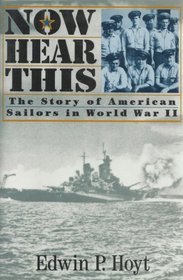The author states his purpose is to tell the story of the junior officers and enlisted men. He does a good job at this...when he does it. But he often delves into analysis of battles and the capabilities of admirals for pages at a time. He should leave this analysis to others. As an example, at the battle of Midway, he states the American victory was entirely due to excellent intelligence and good luck. Actually, intelligence and good luck had a lot to do with it, but what about the decisions of the American commanders and the dedication of all the others in the American forces? He also greatly disparages the admirals in command. Probably because his favorite, Halsey, wasn't there. He calls Halsey the greatest admiral of WW II in the Preface. Yet, numerous historians state that if Halsey had been in command, he probably would have continued the attack on the Japanese fleet, and gotten most of the American fleet sunk in a surface battle with the huge number of Japanese ships the Americans didn't even realize were there until later.
I also wondered at his calling the fleet carrier U.S.S. Yorktown a cruiser. Hopefully, that was just a typo. Another typo I caught was a submarine launched in 1943 which still had combat patrols in 1942. I wonder how many others there were?
The author, who published the book in 1993, bemoans in the Preface that no female or Afro-American sailors 'volunteered' to contribute to the book. Yet, while many of the author's stories were taken directly from primary sources, many others in the book were taken from other published books. So why couldn't he, to round out the book, have used materials from books relating the experiences of these other two groups. I have several books on my shelves relating the stories of female and Afro-American sailors.
Still, the book was interesting in parts, even though I've read more detail in other books on some actions. But this book is not a keeper for me.
I also wondered at his calling the fleet carrier U.S.S. Yorktown a cruiser. Hopefully, that was just a typo. Another typo I caught was a submarine launched in 1943 which still had combat patrols in 1942. I wonder how many others there were?
The author, who published the book in 1993, bemoans in the Preface that no female or Afro-American sailors 'volunteered' to contribute to the book. Yet, while many of the author's stories were taken directly from primary sources, many others in the book were taken from other published books. So why couldn't he, to round out the book, have used materials from books relating the experiences of these other two groups. I have several books on my shelves relating the stories of female and Afro-American sailors.
Still, the book was interesting in parts, even though I've read more detail in other books on some actions. But this book is not a keeper for me.




